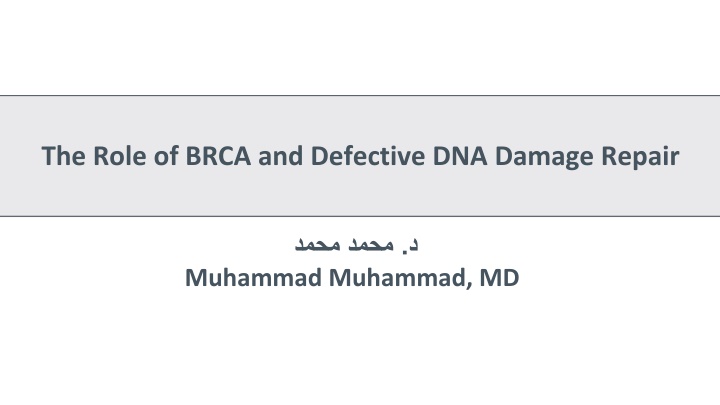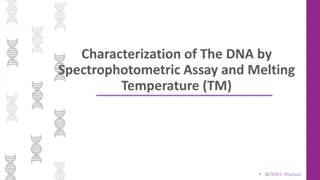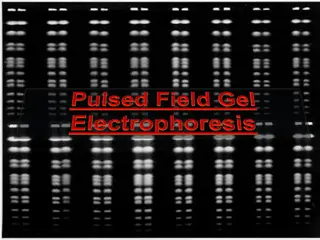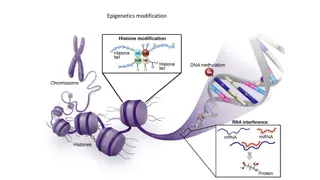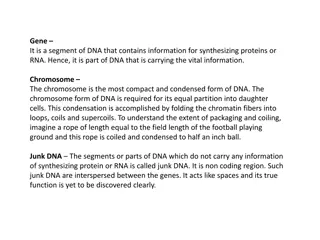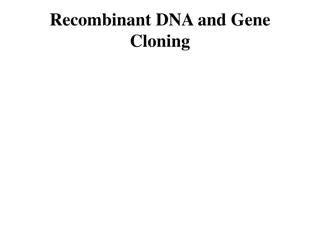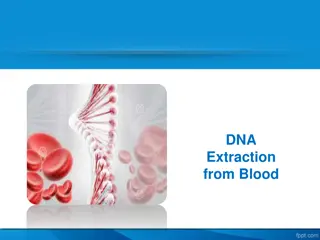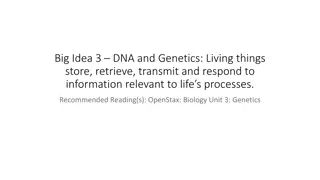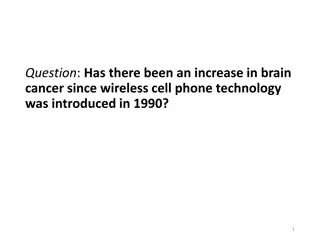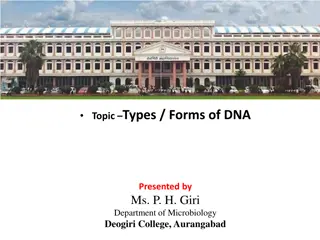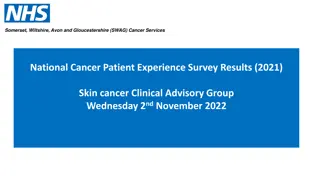BRCA and DNA Repair in Cancer
Role of BRCA and defective DNA repair in cancer, impact of BRCA mutations on treatment response, prevalence of HR pathway mutations in solid tumors, clinical experience with PARP inhibitors in ovarian cancer.
Download Presentation

Please find below an Image/Link to download the presentation.
The content on the website is provided AS IS for your information and personal use only. It may not be sold, licensed, or shared on other websites without obtaining consent from the author.If you encounter any issues during the download, it is possible that the publisher has removed the file from their server.
You are allowed to download the files provided on this website for personal or commercial use, subject to the condition that they are used lawfully. All files are the property of their respective owners.
The content on the website is provided AS IS for your information and personal use only. It may not be sold, licensed, or shared on other websites without obtaining consent from the author.
E N D
Presentation Transcript
The Role of BRCA and Defective DNA Damage Repair . Muhammad Muhammad, MD
Case Presentation 63-yr-old female with pancreatic cancer Strong family history of cancer, including a brother with breast cancer Treated on a vaccine trial preoperatively Found to have metastatic disease intra-operatively at surgery
Case Presentation 63-yr-old female with pancreatic cancer Strong family history of cancer, including a brother with breast cancer Treated on a vaccine trial preoperatively Found to have metastatic disease intra-operatively at surgery Germline deleterious BRCA2 6714 deletion
HR-Deficient Cells Are More Susceptible to PARP Inhibition PARP inhibition prevents repair of SS DNA breaks DS DNA breaks BRCA1/2 critical for DNA repair of DS DNA breaks via homologous recombination Cells defective in BRCA1/2 are more sensitive to PARP inhibition Cancer cells unable to repair double-stranded breaks die through apoptosis Normal cells treated with a PARPi BRCA mutated cells treated with PARPi Normal cells; no PARPi Base Excision Repair Inhibited by PARPi Base Excision Repair Inhibited by PARPi Single strand break PARP1 PARP1 Base Excision Repair Replication fork collapse double-strand break PARP1 Replication fork collapse double-strand break Homologous Recombination deficient Homologous Recombination intact BRCA mutation Homologous Recombination intact BRCA BRCA Break repaired Break repaired by HR Unrepaired DS break Rowe. Breast Cancer Res. 2010;12:203.
Prevalence of Homologous Recombination DNA Damage Repair Mutations in Cancer ARID1A ATM ATRX BAP1 BLM BRCA1 BRCA2 BRIP1 CHECK2 FANCC MRE11A NBN PALB2 RAD50 WRN Overall Prevalence Pathogenic HR pathway mutations seen in 17.4% of the 52,426 solid tumors evaluated Mutation Specific 35 40 35 30 25 20 15 10 5 30 Frequency (%) 25 20 15 10 5 0 0 Heeke. JCO Precis Oncol. 2018;2018.
Clinical Experience: PARP Inhibitors in Ovarian Cancer Multiple clinical trials of PARP inhibitors vs placebo Consistent evidence of increased efficacy in patients with BRCA1/2- mutant tumors PFS: Maintenance Olaparib[1] PFS: Maintenance Rucaparib[2] PFS: Maintenance Niraparib[3] 100 100 100 HR: 0.20 (95% CI: 0.13-0.32; HR: 0.27 (95% CI: 0.17-0.41; P < .001) P < .001) 80 80 Olaparib 75 PFS (%) 60 Neraparib 60 50 40 40 Rucaparib HR: 0.28 (95% CI: 0.20-0.39; P < .001) Placebo 25 20 20 Placebo Placebo 0 0 0 0 3 6 9 12 15 18 21 24 2730 33 36 39 42 45 48 51 54 57 60 12 0 6 18 24 30 36 0 2 4 6 8 10 12 14 16 18 20 22 24 Mos Mos Mos 1. Moore. NEJM. 2018;379:2495. 2. Coleman. Lancet. 2017;390:1949. 3. Mirza. NEJM. 2016;375:2154.
PARPi + Platinum in Pancreatic Cancer Phase IB dose-finding trial of veliparib + cisplatin/gemcitabine in previously untreated advanced PDAC (N = 17)[1] Best Target Response in Patients[1] 10 8 10 0 -10 -20 -30 -40 -50 -60 -70 -80 -90 -100 4.1 10 0 Best Target Response (%) -2.8 -4.2 -4.3 -6.7 1 CR and 6 PRs -14.3 -21.4 ORR: 78%; median OS (gBRCA+): 23 mos -47.3 -62.9-66.7-68.8-72.4-75 Randomized phase II trial in pancreatic cancer ongoing[2,3] BRCA+ BRCA- -100 Patient 1. O Reilly. Cancer. 2018;124:1374. 2. Lowery. Eur J Cancer. 2018;89:19. 3. NCT01585805.
POLO: Olaparib as Maintenance Therapy in Germline BRCA Mutated Pancreatic Cancer Randomized, double-blind phase III trial Randomized 3:2 RECIST assessment Q1W up to 4 wks, then Q4W until PD or unacceptable toxicity per investigator assessment Patients with metastatic pancreatic cancer with germline BRCA1/2 mutation who did not progress on first-line platinum-based chemotherapy (N = 154) Olaparib 300 mg BID Placebo Primary endpoint: investigator-assessed PFS (RECIST v1.1) Secondary endpoints: safety, OS, PFS2, TFST, TSST, TDT, OR, DCR, QoL Kindler. ASCO 2019. Abstr LBA4. NCT02184195
POLO: Olaparib as Maintenance Therapy in gBRCA- Mutated Pancreatic Cancer February 26, 2019, press release: Statistically significant and clinically meaningful improvement in PFS with olaparib vs placebo Safety and tolerability profile of olaparib was consistent with previous trials Detailed results presented at ASCO 2019 Kindler et al. Abstract LBA4.
PARP Inhibitors: Targeting DDR Mutations Beyond BRCA Clear evidence of olaparib efficacy in non-BRCA mutated prostate cancer[1] Promising evidence of olaparib vs placebo/paclitaxel in ATM-deficient recurrent gastric cancer In randomized phase II trial, significant OS improvement with olaparib in overall and ATM-low populations (N = 124)[2] In randomized phase III trial, no difference in OS, BUT study population not enriched for ATM-low tumors (N = 525)[3] 1. Mateo. NEJM. 2015;373:1697. 2. Bang. JCO. 2015;33:3858. 3. Bang. Lancet Oncol. 2017;18:1637. 4. Golan. ASCO 2018. Abstr 297.
Case Presentation 63-yr-old female with pancreatic cancer Treated on vaccine trial preoperatively; found to have metastatic disease at surgery Germline deleterious BRCA2 6714 deletion Enrolled on phase II trial of FOLFOX + veliparib; remained in near CR through 15 mos Baseline nCR at 15 mos
Go Online for More CCO Coverage of Cancer Biomarkers! CME-certified on-demand Webcast of the symposium from ASCO 2019 Downloadable slides from the ASCO 2019 symposium 10 Downloadable Summary Resources clinicaloptions.com/oncology clinicaloptions.com/biomarkers19resource
